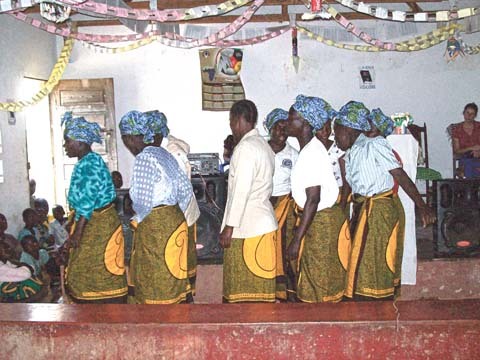Tete''s Real Heroes

It didn't take long to feel the full impact of what it means to be in back in Tete Province, Mozambique. My wife, Arla, and I received a warm welcome from the 90-degree weather and a not so warm welcome from the customs official's stern look. He could not understand why we were bringing 500 pens with us. 'Surely this merchandise should be taxed,' he must have been thinking. However, after a brief explanation that we brought the pens to share, the puzzled official reluctantly waved us on through to the arrival area.
We were in excited to be in Mozambique for our 2011 Ministry Project to Tete Province. This was our third visit since leaving Mozambique in 2005. When serving there, I was 'area coordinator' responsible for Tete Province (Area 3) from 2000-2004. It was one of the pioneer areas, along with Maputo and Gaza Provinces, when the Church of the Nazarene first began its work in Mozambique. The pens and other small gifts were items we wanted to share with our hosts.
At the airport that hot day, we were met by Albino Banda. Now he is coordinator of Area 3. The plan was to go straight from the airport and travel about three hours to Villa Ulongwe (or 'Villa') for our first speaking engagement.
Long before we reached Villa, the sun had set. We were met by Martinho Vece Soda, superintendent of this new Angonia District. The people who had gathered for the service were tired. They had been waiting for the missionaries for a long time. But in true Mozambican tradition the service couldn't start until we, the guests, were served tea.
After our tea time the service started. Music, prayer, special greetings, and introductions - it was a bit strange to hear the district superintendent talk about 'our coordinator' because he was no longer referring to me, but to Banda. Prior to us leaving Mozambique, I spent four years working with and training Banda. Did I have questions about Banda's ability to lead as coordinator of Area 3, Tete Province? Absolutely not. Rather I doubted my abilities. Had I done a good enough job training him?
It was now time for me to share with the congregation. First, Banda stepped to the pulpit and began introducing the 'heroes' of Area 3. Heroes? Who was he talking about? We're not heroes. I'm not even sure we should say we have heroes in the church, but if we do, they are not us. If I were asked to name missionary heroes for Mozambique, I would come up with names like Oscar Stockwell, Mary Cooper, Armand Doll, Hugh Friberg, and others.
During the short introductory session that night in Villa, I was pleased to hear the pastors had done their homework that I had sent them a few weeks earlier, memorizing the Great Commission (Matthew 28:19-20). We returned the next day for several hours of teaching and preaching on the four-fold mission of the Great Commission: going, making disciples, baptizing, and teaching obedience.
The next day we traveled to Macanga District to teach and preach at their center in Furancungo Mission with District Superintendent Elias Derezina. What should have been a three-hour trip turned into more than a five-hour journey because the dirt roads had been badly damaged by excessive summer rains. We arrived around noon to find another crowd of people who had been waiting for us for a very long time.
Although the crowd had been waiting quite some time, they retained their enthusiasm. After the obligatory tea at the district superintendent's home, we were met at the entrance to the mission by the people singing, clapping, waving, and smiling to welcome us royally as they escorted us up the hill to the church.
This time when Banda introduced us as heroes, I was ready with a response.
'We are not heroes but merely servants. If there are heroes in the church, they are you. You are the ones who are making great sacrifices to fulfill God's call on your lives. You are serving faithfully.'
At the end of our services at Furancungo Mission I told the people we would love to come back in two or three years if the Lord allows. I also reminded them that if we don't meet again on this earth we can meet again in heaven.
As we said our good-byes, some of my heroes left on a flat bed truck, others on a tractor-drawn trailer, some on bicycles, and the rest on foot. The sun was setting as we headed down the bumpy dirt road for our next adventure.
Sometimes life's greatest moments come when we see things from other perspectives. Having been Nazarene missionaries and now seeing these local ministers and lay people take on leadership roles, reminds me that sometimes God calls us to serve for a time, for a place, for a reason. I am grateful to the Church of the Nazarene in Area 3 and in all areas of the world where men and women are sharing their faith in Jesus Christ, often in heroic ways.
Jim Buchanan and his wife, Arla, were missionaries in South Africa, Swaziland, and Mozambique from 1984-2005. Jim is now the pastor of the Havana, Illinois, Church of the Nazarene.
Holiness Today, July/August 2011
Please note: This article was originally published in 2011. All facts, figures, and titles were accurate to the best of our knowledge at that time but may have since changed.




